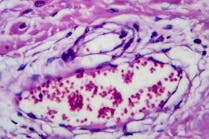New study data shows that the immuno-oncology drug, atezolizumab is a safe and effective treatment for stage IB-IIIB non-small cell lung cancer patients prior to lung cancer surgery, according to a new study led by researchers with The Ohio State University Comprehensive Cancer Center – Arthur G. James Cancer Hospital and Richard J. Solove Research Institute (OSUCCC – James) as part of the national Lung Cancer Mutation Consortium 3 study.
Researchers found that the survival of patients in this new study was far better – about 80% at three years post treatment and approximately twice as good as that which would be expected with surgery and chemotherapy alone. Study investigators also report data showing that the presence of high numbers of natural killer (NK) cells – a type of immune cell found in the blood before treatment – were associated with poor immunotherapy treatment effectiveness in this study. Patients with high levels of these cells might benefit from the addition of NK-specific therapy.
The findings appear in the Sept. 12, 2022, issue of Nature Medicine.
Led by Dr. David Carbone of the OSUCCC – James, this national clinical trial involved 181 patients recruited from 15 cancer centers across the United States.
For this new study, researchers sought to gather a more definitive picture of direct immuno-oncology treatment benefits by collecting pre- and post-surgery pathologic samples and peripheral blood to measure immune cell profiles that correlated with clinical benefit.
In this study, researchers report that 20% of NSCLC patients treated with two cycles of pre-surgery atezolizumab experienced a major pathological response (MPR) before time of surgery. MPR was defined in this study as having less than 10% of viable cancer cells existing in the tumor at the time of surgery, indicating most cancer cells in the tumor tissue had been destroyed by the pre-surgery immunotherapy treatments. Additionally, about 7% had a complete pathological response when treated with just these two doses of pre-surgery (neoadjuvant) immuno-therapy.





